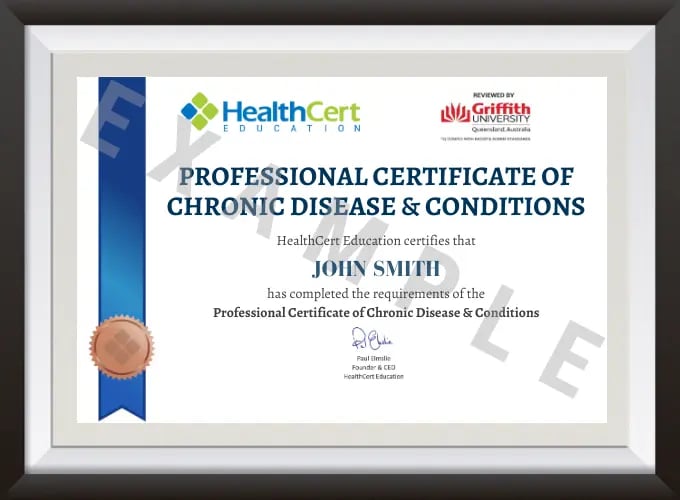Early recognition and proper management of ringworm are essential to relieve symptoms, prevent...
.jpg?height=200&name=article%20(1).jpg)
Understand common chronic illnesses, with an emphasis on disease prevention, treatment, and ongoing management.

In this online program, you will gain a comprehensive understanding of the management of congestive cardiac failure, COPD, diabetes, gastrointestinal problems, chronic kidney disease, and osteoarthritis, to better support your patients and reduce the impact of comorbidities.
- This course is perfect for practitioners with no to little training in this area.
- Learn about managing the provision of chronic health care and communicating with your patients to optimise their understanding and compliance.
- This course is for medical doctors, International Medical Graduates, registered nurses, and degree-qualified health professionals
- CPD-accredited and university-reviewed.
Fulfils 50 hrs for medical professionals in Australia*
100% online
$1595
Special rates available
84.5 hours
Self-paced
*provided an outcome measurement activity with a minimum of 5 hours is completed.

- Gain the skills to optimise patient outcomes through primary care intervention of chronic diseases, which affect about 58 per cent of all presenting patients.
- Provide immediate chronic health management and help to prevent and address comorbidities.
- Reduce the burden of chronic disease, which is the underlying cause of 90 per cent of deaths in Australia.
Get unlimited access to all course content, additional learning materials, ongoing post-course support, and more.
This module focuses on applying effective communication strategies to enhance history-taking and outlining management plans in order to optimise the patient’s understanding, compliance and satisfaction. The 10 steps include preparation for the consult; connection or re-connection; information gathering on history and examination; responding to patient’s thoughts, feelings and expectations; formulation of a diagnosis and treatment plan; patient education, managing behaviour change; closing the consult; and preparation for next consult.
This module begins with an overview of congestive cardiac failure including classification guidelines and prevention strategies. The diagnosis, pathophysiology and investigation of heart failure are outlined including charts, diagrams and images. Causes of heart failure including myocyte damage and loss, abnormal loading conditions and arrhythmias are covered. Further information on aetiology and ongoing assessment in CCF where causes of heart failure are not apparent from the history, examination and investigations are outlined. The management and co-morbidities of these symptoms are discussed. The module concludes with a discussion on the management and prognosis of acute heart failure including end of life care.
This module begins with an explanation of COPD, including the aetiology and pathogenesis of this condition. The module then discusses the COPD-X guidelines to assist with the diagnosis and management of COPD. The COPD-X guidelines include Case finding and confirming diagnosis, Optimising function, Preventing deterioration, Developing a plan of care, and management of eXacerbations. The module concludes with the diagnosis and management of adult asthma, including when asthma and COPD overlap.
This module focuses on diabetes mellitus. This chronic and progressive disease is described, including screening guides and pathology testing to assist with diagnosis. It discusses how to initiate and plan long-term management with the goal to achieving glycaemic control. It also outlines a step-by-step approach in explaining the diagnosis and management to patients. To cover all aspects of care, the diabetes management is broken down into components, including glycaemic and weight control, diet and exercise, lifestyle choices, renal function, eye and foot health, blood pressure, lipids, and comorbidities. The module concludes with the medical management of glycaemia.
This module outlines the prevalence of common gastrointestinal complaints and the impact they have on those affected by them. It contains diagnostic and management tools and considers management options when complications occur. An overview of the GI tract and classifications of gastrointestinal disorders are detailed. There is focus on the symptoms of gastrointestinal disorders including coeliac disease, GORD, inflammatory bowel disease, diverticular disease and irritable bowel syndrome. Clinical cases are presented for each disorder with suggested approaches to diagnosis, investigations, treatment and management of these conditions.
This module begins with an overview of chronic kidney disease and discusses the method of detecting and evaluating this condition. It then explains the diagnosis and management of this disease. Ways to delay the progression of chronic kidney disease including lifestyle choices, how to prevent an acute kidney injury, and management of blood pressure and albuminuria are outlined. Possible complications including hypertension, anaemia, mineral and bone disorder, oedema and metabolic acidosis are discussed in detail. The module concludes with the management of chronic kidney disease in the context of multi-morbidity and outlines commonly prescribe drugs that can exacerbate kidney function.
This module outlines how to diagnose and manage osteoarthritis to achieve functional gains, utilising lifestyle changes and appropriate pharmacological treatment. It includes how to conduct an examination and assessment of osteoarthritis and discusses the diagnostic criteria in diagnosing knee and hip osteoarthritis. It explains the role of imaging, differential diagnosis and investigations used to diagnose this condition. The main goals of osteoarthritis management including non-pharmacological therapies, patient education and goal setting are discussed in detail. The module concludes with a case study that focuses on developing an osteoarthritis management plan to achieve treatment goals.
This module describes the steps in implementing a coordinated model of care for the management of chronic disease. The definitions of chronic disease are outlined including the benefits and limitations of guidelines. Patient-centred and collaborative care approaches based on evidence-based medicine are discussed. The module then focuses on the use of chronic disease management models and outlines the major components of high-quality chronic illness care. The module concludes with the discussion of a case study focusing on the preparation of a general practice chronic disease management plan.

Associate Professor of Epidemiology (Chronic Diseases)
A/Prof Nicola Hawley is an Associate Professor of Epidemiology (Chronic Disease) and Anthropology at the Yale School of Public Health. Her expertise is in the aetiology and prevention of obesity-related chronic disease in resource-poor, low-income settings. Her research focuses predominantly on Pacific Islander populations, although she has ongoing collaborations in South Africa, Uganda, Honduras, China, Columbia and the US.
Methodologically, A/Prof Hawley employs a life-course approach that utilises cross-sectional, cohort, and randomised controlled trial designs to address questions of causality and identify critical periods of susceptibility. She is a mixed-methods expert and an advocate for community-engaged approaches to research, intervention, and development of health policy.
A/Prof Hawley’s current research focuses broadly on: (1) understanding how maternal and child health are impacted by rising levels of obesity and diabetes in resource-poor settings; (2) determining how innovations in healthcare delivery can impact identification and treatment of obesity-related disease during the perinatal period; and (3) developing interventions focused on pregnancy, childhood, and adolescence to prevent the intergenerational transmission of obesity-related disease.

Certificate of Family Planning, Graduate Diploma of Medical Education
Associate Professor Debbie Kors is the founder and joint owner of a private teaching general practice in Port Macquarie, Australia. She works there as a general practitioner and GP supervisor of GP registrars and medical students.
A/Prof Kors is a passionate advocate for the profession of general practice. She is a Conjoint Associate Professor in Primary Health Care at the UNSW Rural Clinical School, Port Macquarie campus and has previously worked as a senior medical educator with North Coast GP Training. In 2010, she was nominated for and won the General Practice Education and Training GP Supervisor of the Year award.
A/Prof Kors holds a MBBS (first class honours), Fellowship of the RACGP, Masters of Family Medicine (clinical), Diploma of the Royal Australian College of Obstetricians and Gynaecologists, Graduate Diploma of Medical Education and a Certificate of Family Planning.

Dr Christine Ahern has worked as a general practitioner in rural NSW since 1983, often with Aboriginal and Torres Strait Islander communities. Her special interests include women’s health and education.
Dr Ahern is a senior lecturer at Sydney University and has previously been the Director of Training for North Coast GP Training. In 2011 she was named the General Practice Education and Training Medical Educator of the Year, a prestigious national award. Dr Ahern holds a MBBS and FRACGP.

Dr Evangelia (Valia) Francis enjoys all aspects of General Practice but is especially interested in skin medicine, women's health and medicine of the elderly.
Originally from the coastal town of Kavala in Greece, Dr Francis is involved in teaching medical students as a Conjoint Lecturer in the Rural Medical School of Port Macquarie as well as teaching registrars. It is a very fulfilling aspect of her work that has been greatly inspired and supported by the senior educators at her practice.
When not at work, Dr Francis tries to fight waves with surf or paddle boards (so far they always win!), is training hard to become the next MasterChef winner, and enjoys reading books and learning new languages.

General practitioner
Dr Hilton Koppe is a rural GP in Lennox Head, NSW. He combines his clinical work with an active role in medical education, training new and experienced GPs within the region and around Australia. In 2015 he was a guest at Harvard Medical School as Visiting Professor of Medicine and Humanities.


$1595
*provided an outcome measurement activity with a minimum of 5 hours is completed.
Bundle two courses and save 5%, or three courses and save 10% upon enrolment.
Talk to us about deferred payment options, registrar scholarships and special rates.
*For Australian residents only: Online course prices are shown exclusive of GST. If you are GST-registered, please enter a valid ABN at checkout to ensure GST is not applied. Otherwise, 10% GST will be added at checkout. View our FAQ for more information.


HealthCert courses have become the standard by which you gauge all others.
Dr K. Abolarinwa
Good courses with excellent speakers. I particularly enjoyed the case study scenarios which helped to integrate the knowledge gained.
Dr A. Tucker
This is the pathway to improve your confidence and evolve into the GP you aspire to be.
Dr S. Shinwari
| RACGP Activity Number | ACRRM Activity Number | Activity Title | Education Hours | Performance Hours | Outcome Hours | ||
|---|---|---|---|---|---|---|---|
| 441352 | 31082 | Diabetes Mellitus | 441352 | 31082 | 4.5 | 6 | 0 |
| 441360 | 31083 | Gastrointestinal complaints | 441360 | 31083 | 5.5 | 6 | 0 |
| 441312 | 31079 | Communication Skills in General Practice | 441312 | 31079 | 5.5 | 6 | 0 |
| 441343 | 31081 | Chronic Obstructive Pulmonary Disease (COPD) | 441343 | 31081 | 4.5 | 6 | 0 |
| 441329 | 31080 | Congestive cardiac failure | 441329 | 31080 | 4.5 | 6 | 0 |
| 441450 | 31085 | Osteoarthritis | 441450 | 31085 | 4 | 6 | 0 |
| 441500 | 31086 | Managing the Provision of Chronic Health Care | 441500 | 31086 | 4 | 6 | 0 |
| 441373 | 31084 | Chronic kidney disease | 441373 | 31084 | 4 | 6 | 0 |
| 802617 | 32982 | Diabetes Outcome Improvement Activity | 802617 | 32982 | 0 | 0 | 8.5 |
| Total hours | 36.5 | 48 | 8.5 | ||||
View the CPD Hours for all HealthCert Education activities.
The purpose of outcome measurement activities is to improve your clinical confidence in managing an identified learning gap. Outcome measurement activities are not a requirement of our Professional Certificate of Advanced Certificate courses; they are a requirement for Australian CPD purposes.
HealthCert Education provides a variety of outcome measurements activities to suit your needs:
The Professional Certificate of Chronic Disease & Conditions is for degree-qualified medical professionals who wish to learn how to improve patient outcomes, especially those patients with chronic health issues commonly seen in general practice. This qualification is the first stage of the Professional Diploma of Chronic Disease & Conditions.
This course is for physicians and degree-qualified medical professionals. There are no prerequisites.
Participants do not have to pass an IELTS test but, as the courses are delivered in English, proficiency in listening, reading and writing English is assumed.
Participants will require access to a computer/laptop, an internet connection and a basic level of technology proficiency to access and navigate the online learning portal.
This certificate course meets the minimum 50 hours CPD annual requirement across all three mandatory CPD activity types, provided an outcome measurement activity with a minimum of five hours is completed. You may use an optional HealthCert outcome measurement activity or develop your own.
Outcome measurement activities are not a requirement of Professional or Advanced Certificates.
Upon successful completion of the course requirements, course participants will receive the Professional Certificate of Chronic Disease & Conditions and CPD hours.
This certificate course:
To learn more about the delivery of certificates in Australia and overseas, please visit our FAQs.
Professional Diploma Pathway
This course is the first stage of the three-part professional diploma pathway. The full pathway is Professional Certificate of Chronic Disease & Conditions, Advanced Certificate of Chronic Disease & Conditions, and Professional Diploma of Chronic Disease & Conditions.
This organisation is an RACGP-accredited CPD provider under the RACGP CPD Program.




Don't see your question? Explore other faqs or talk to us.
Fees will vary based on the program and study option selected (fully online vs online + optional practical workshop). Payments can be made upfront or in monthly instalments. Special rates and various payment options are available. GP registrars and doctors in training enjoy a scholarship of up to $500. Talk to us to learn more.
Completion of any HealthCert course or attendance at an event will enable you to access the HealthCert Alumni Program which includes:
HealthCert Education is pleased to issue digital credentials for alumni. Digital credentials are a permanent online record of your successful completion of a HealthCert course and are issued to all course participants in addition to PDF certificates. If you are based in Australia, you also have the option to order a hard copy of your digital certificate for a small additional fee.
The recommended study duration of this certificate course is 84.5 hours, which includes study of the pre-course activities and readings, online lectures, live tutorials, and online assessment. This self-paced course offers the flexibility of 100% online study in your own time, at your own pace, in your own home or office, with no mandatory face-to-face requirements. You are not required to be online at specific times but can view and replay video lectures at your convenience.
All HealthCert courses meet World Federation of Medical Education standards. This certificate course qualifies for CPD hours from the Royal Australian College of General Practitioners (RACGP) and the Australian College of Rural and Remote Medicine (ACRRM) in Australia. It is recognised by the Royal New Zealand College of General Practitioners (RNZCGP) in New Zealand. It is recognised by the Hong Kong College of Family Physicians (HKCFP) in China. It is a self-submitted activity in Dubai and the United Kingdom. It is a self-submitted activity through the College of Family Physicians in Canada. If you live or work outside one of the above-mentioned countries, please contact us on admin@healthcert.com to discuss whether this course can be recognised in your country.
Want to stay up-to-date with the latest case studies, podcasts, free video tutorials and medical research articles pertinent to primary care?
Our Education Advisors can assist you with any queries and tailor our education pathway to suit your current expertise, interests and career goals.